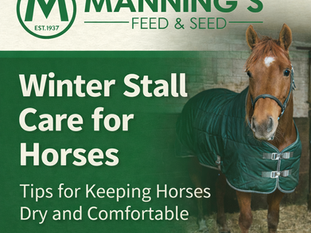
The Benefits of Forage-Based Diets: Why Hay Still Matters
Jun 24, 2025
2 min read
0
40
0

When it comes to your horse’s nutrition, one thing remains constant—forage is the foundation. At Manning’s Feed and Seed, we know that hay isn’t just filler—it’s fuel. Whether your horse is a retired pasture pal or a high-performance athlete, quality forage is critical for maintaining digestive health, proper weight, and overall well-being.
Why Forage Comes First
Horses are natural grazers, and their digestive systems are designed to process forage around the clock. When forage is the mainstay of their diet, it supports:
• Healthy digestion by encouraging steady gut movement and preventing ulcers
• Natural chewing behavior which promotes dental health and reduces boredom
• Balanced energy without excessive sugars or starches
� • Weight maintenance in all types of horses
Even horses on grain-based feeds should still get the bulk of their daily calories from forage.
Know Your Hay Types
Not all hay is created equal! Here's a quick guide to the most common types:
• Coastal Bermuda – Common in the South, low in protein but high in fiber. Ideal for easy keepers.
• Timothy – A favorite for many horse owners, great balance of protein and fiber.
• Alfalfa – High in protein and calcium, perfect for lactating mares or horses that need weight gain.
• Orchard Grass – Soft, palatable, and good for horses with allergies to other hay types.
• Perennial Peanut Hay – Often called the “alfalfa of the South,” this legume hay is high in digestible energy and protein, making it a great option for performance horses or hard keepers. It’s also highly palatable and grows well in warm climates.
Tip: Always choose hay that is clean, green, and sweet-smelling—never dusty or moldy.
Hay Storage Matters
Preserving the quality of your hay is just as important as choosing the right type. Here are a few simple tips:
• Store off the ground to avoid moisture buildup
• Keep under cover—a tarp works in a pinch, but a barn or shed is best
• Allow for airflow between bales to prevent mold
• Use hay quickly—older hay loses nutritional value over time
Stock Up at Manning’s
We keep a steady supply of high-quality hay bales available at both our Milton and Pace locations. Whether you need a few bales or a truckload, our team is here to help you choose the right forage for your horse.
📍 Stop by to browse our hay selection or give us a call—we’re happy to load it for you!
Final Thought
Feeding forage isn’t just tradition—it’s the smartest way to support your horse’s health from the inside out. If you have questions about what hay is right for your horse, come talk to us at Manning’s Feed and Seed. We’ve been helping horse owners feed with confidence since 1937.





